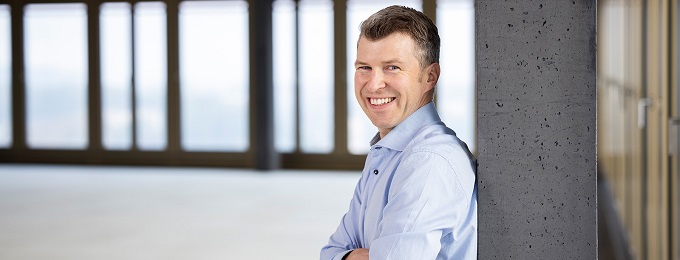“The strongest driver for change is a motivated person”, says the Managing Director of the newly inaugurated ETH AI Centre, Dr. Alexander Ilic.
On 20 October, ETH Zurich, Europe’s top university in Switzerland, officially launched a new centre for research in Artificial Intelligence (AI). The ETH AI Centre will take an interdisciplinary approach to AI, says its managing director Dr. Alexander Ilic. Students of different backgrounds and origin are encouraged to apply for the Centre’s doctoral fellowships, where they are co-supervised by people of different departments, combining for example a background in sustainability with knowledge in AI. To date, the AI Centre counts 29 professorships across seven departments, and aims to establish collaborations with all 16 departments of ETH. One of the Centre’s main pillars is a strong focus on people, for Ilic the reason why the Centre needed to have a dedicated physical space: “One part is to provide the right environment to inspire people, but then it’s about enabling spontaneous collaboration. At the Centre, a lot of motivated people are coming together, and while getting coffee, spontaneous ideas can happen.” The doctoral fellows have their primary offices at the Centre, to where also start-ups are invited. Ilic himself has a background as an entrepreneur, and noticed that even though Switzerland consistently ranks high in innovation, little to no big tech companies come from Switzerland, and many students in AI already get job offers before they even graduate. By strengthening the dialogue between research and industry, the AI Centre encourages students to pursue start-up ideas already during their studies, opening up their career-path.
Another asset for the Centre is the collaboration between likeminded research institutes all over the world, but especially in Europe. The Centre is a member of the European Laboratory of Learning and Intelligent Systems (ELLIS), and as such encourages its students to spend time abroad in one of the 29 partner institutes. ETH has also joined forces with the Max Planck Society to establish the Max Planck ETH Center for Learning Systems in Tübingen, where researchers from Tübingen, Stuttgart and Zürich work hand in hand on machine learning applications. “We see our Centre as one that invites others. We try to bring different initiatives together and provide the highest level of synergies”, so Ilic. The Center aims to “break down barriers around geography and collectively work towards a vision of trustworthy, accessible and inclusive AI”.
Trustworthy AI is also one of the key goals of the European Commission’s White Paper on Artificial Intelligence (see SwissCore article). Through the Ethics Guidelines for Trustworthy AI elaborated by the High-Level Experts Group on AI, and with an AI-regulation in the making, the Commission aims to foster excellent, human-centric AI made in Europe. This resonates with the ETH AI Centre. According to Ilic, technological progress is inevitable, however, Switzerland and Europe should not be hesitant about change: “If we’re not taking the chance to shape it according to our values, then we have to accept what’s happening”, he says. “We have noticed that AI is picking up in attention, and it has the potential for significant changes in the way we work and live. So from the research side, we want to take a proactive stance to shape [this process] in a positive way”. The AI Centre’s director thinks that Switzerland can bring a lot to the table, as it is has a reputation for a high level of trust and its economy has a strong backbone of small- and medium-sized enterprises. However, he also sees that Switzerland is sometimes too hesitant when it comes to technological progress. “There is a lot of positive momentum and good ingredients”, he says, “but it’s all about getting out of your comfort zone and creating something new”.
That is exactly what ETH Zurich is trying to do with the AI Centre: motivate people to get out of their comfort zone and allow for spontaneous collaboration. Because, as the Centre’s director puts it: “The strongest driver for change is a motivated person”.
See video of interview with Dr. Alexander Ilic here.

